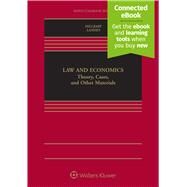Law and Economics Theory, Cases, and Other Materials (Connected eBook + Print book)
, by Dillbary, J. Shahar; Landes, William M.- ISBN: 9781454833895 | 1454833890
- Cover: Hardcover
- Copyright: 9/14/2021
Buy a new version of this textbook and receive access to the Connected eBook on CasebookConnect, including: lifetime access to the online ebook with highlight, annotation, and search capabilities, plus an outline tool and other helpful resources. Connected eBooks provide what you need most to be successful in your law school classes. Learn more about Connected eBooks.
Law and Economics: Theory, Cases, and Other Materialsis a comprehensive introduction to the subject area of law and economics, with stimulating in depth discussion of actual case law by two leading scholars in the field. It provides a clear description of the key points of law and economics across various substantive areas of law, combining the traditional approach to the study of law and economics with new important insights from behavioral economics and competing theories. Importantly, Law and Economics artfully introduces and connects theory to practice to provide a coherent picture rather than a patch-like studying experience. Using detailed case-notes, comments and examples, Law and Economics explains why future lawyers should care about economic analysis of the law and how economics can and should play a role in litigation and conflict resolution. This important new casebook not only makes law and economics accessible to students but also indubitably establishes the importance of law and economics in a globalized world.
Highlights of the First Edition:
- Introduces students to basic tools (e.g., game theory and decision theory) and concepts (e.g., efficiency criteria) using simple and innovative methods
- Facilitates the understanding of complicated concepts by providing the theoretical backgrounds as well as clear explanations, examples, exercises, and comprehensive comments and notes that do not require any background in math or economics
- Allows readers to test their understanding by providing practice questions with full answers
- Carefully selected cases, with discussion emphasizing the economic rationales underlying decisions and demonstrating how these rationales impact decisions
- Marries the virtues of a textbook (explaining the theoretical underpinning of different economic notions and how they relate to different legal doctrines) to those of acasebook by tying concepts to actual decisions
- Adopts a modern approach that covers competing theories as they relate to specific decisions and theories
- Includes methodology chapters where the same methodology (e.g., decision making, game theory, supply and demand) is used to analyze different areas of the law, as well as subject matter chapters in which specific areas of the law (e.g., property) are analyzed using different methodologies
- A modular structure, allowing the professor to pick and cover materials in almost any order, to skip certain materials and to focus on court decisions, the theory, or both
Professors and students will benefit from:
- The use of alternative intuitive methods to explain theories
- The use of simple algebra to teach the most complex subjects
- The artful combination of theory with a practical approach that ties the economic concepts (including game theory and decision theory) to specific subject matters, legal rules and specific decisions
- In-depth discussion of decisions and how they could they be explained or argued differently in light of the theoretical concepts reviewed
- The use of summary boxes to recap complicated concepts
- Fantastic notes and practical questions following cases







